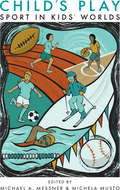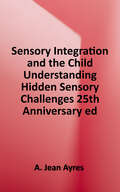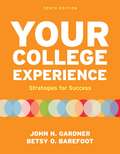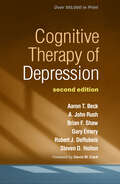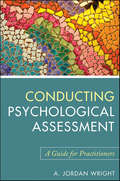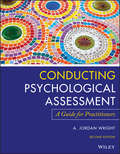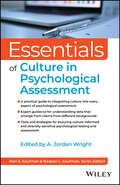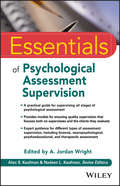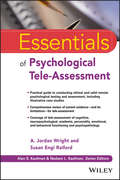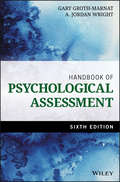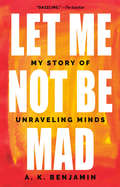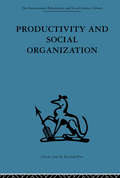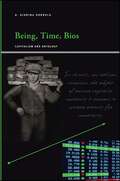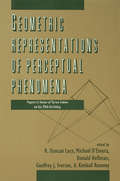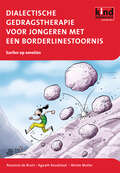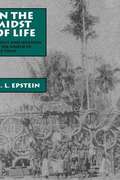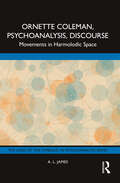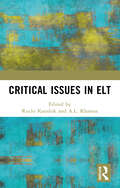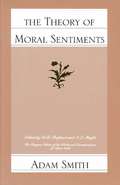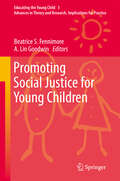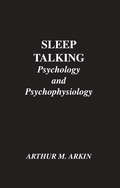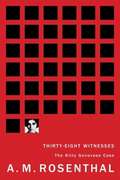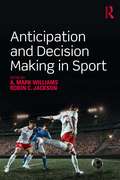- Table View
- List View
Child's Play: Sport in Kids' Worlds
by William A. Corsaro Michael Kehler Torrie Hazelwood Toben F Nelson Michela Musto Professor Jeffrey Montez de Oca Phil Veliz Nicole M. Lavoi Lauren Rauscher A. James Mckeever Chelsey Thul Jeffrey Scholes Brandon Meyer Professor Douglas Hartmann Don Sabo Ann Travers Murray J. Drummond Alex Manning Fatimah Hussein Cheryl Cooky Professor Michael A. MessnerIs sport good for kids? When answering this question, both critics and advocates of youth sports tend to fixate on matters of health, whether condemning contact sports for their concussion risk or prescribing athletics as a cure for the childhood obesity epidemic. Child's Play presents a more nuanced examination of the issue, considering not only the physical impacts of youth athletics, but its psychological and social ramifications as well. The eleven original scholarly essays in this collection provide a probing look into how sports--in community athletic leagues, in schools, and even on television--play a major role in how young people view themselves, shape their identities, and imagine their place in society. Rather than focusing exclusively on self-proclaimed jocks, the book considers how the culture of sports affects a wide variety of children and young people, including those who opt out of athletics. Not only does Child's Play examine disparities across lines of race, class, and gender, it also offers detailed examinations of how various minority populations, from transgender youth to Muslim immigrant girls, have participated in youth sports. Taken together, these essays offer a wide range of approaches to understanding the sociology of youth sports, including data-driven analyses that examine national trends, as well as ethnographic research that gives a voice to individual kids. Child's Play thus presents a comprehensive and compelling analysis of how, for better and for worse, the culture of sports is integral to the development of young people--and with them, the future of our society.
Sensory Integration and the Child Understanding: Hidden Sensory Challenges
by A. Jean AyresThis classic handbook, from the originator of sensory integration theory, is now available in an updated, parent-friendly edition. Retaining all the features that made the original edition so popular with both parents and professionals, this book remains the best book on the subject. With a new foreword by Dr. Florence Clark and commentaries by recognized experts in sensory integration, this volume explains sensory integrative dysfunction, how to recognize it, and what to do about it. Helpful tips, checklists, question-and-answer sections, and parent resources make the new edition more informative and useful. Indispensable reading for parents, this book is also an excellent way to improve communication between therapist, parents and teachers. The original edition was the first book to explicate sensory integrative dysfunction, and this edition offers new insights and helpful updates in an easy-to-use format.
Your College Experience: Strategies for Success (Tenth Edition)
by A. Jerome Jewler John N. Gardner Betsy O. BarefootWritten by the leading authorities on the first-year seminar and grounded in research, Your College Experience by John Gardner and Betsy Barefoot offers today's diverse students the practical help they need to make the transition to college and get the most out of their time there. Goal setting has always been central to this text, and the Tenth Edition has been revised with added coverage and activities to strengthen this material throughout. In addition, a new focus on self-assessment of strengths will help students see where they are already succeeding so that they get off to a great start and stay in college. A full package of instructional support materials -- including an Instructor's Annotated Edition, Instructor's Manual, PowerPoint slides, videos, and a Test Bank -- provides new and experienced instructors all the tools they will need to engage students in this course and increase student retention.
Cognitive Therapy of Depression
by Aaron T. Beck Brian F. Shaw A. John Rush Gary Emery Steven D. Hollon Robert J. DeRubeisReflecting major contemporary developments in theory and clinical practice, the second edition of this authoritative guide has been significantly rewritten with 85% new material. Cognitive therapy (CT) pioneer Aaron T. Beck and associates provide cutting-edge knowledge about the cognitive model of depression and the most effective, lasting ways to reduce clients' suffering. The volume links clearly explained theoretical principles to specific therapeutic strategies. Techniques for identifying, examining, and changing the thoughts, beliefs, and behaviors that give rise to depression and related disorders are illustrated with compelling vignettes and sample dialogues. New to This Edition *Reflects the maturation of CT for treating more complicated presentations, including patients with chronic depression or underlying personality disorders. *Brings therapists up to date on schema-focused approaches as well as classic cognitive and behavioral interventions. *Incorporates data from basic research and many dozens of clinical trials. *All-new vignettes and a chapter-length case example. *Greater attention to the therapeutic relationship and to longer-term treatment.
Conducting Psychological Assessment
by A. Jordan WrightA Valuable Guide to the Entire Process of Psychological AssessmentCarefully working through all the phases of assessment, including integrating, conceptualizing, test selection, administering, scoring, and report writing, Conducting Psychological Assessment provides clinicians with a step-by-step methodology for conducting skilled individual assessments, from beginning to end.Unlike most guides to assessment, this book addresses the critical steps that follow administration, scoring, and interpretation--namely the integration of the data into a fully conceptualized report. Rich with case studies that illustrate every major point, this text provides a coherent structure for the entire process, taking into account the imperfection of both clinical intuition and specific psychological tests.Conducting Psychological Assessment presents practitioners with an accessible framework to help make the process of psychological assessment quicker, easier, and more efficient. It offers a model designed to ensure that assessors provide ethical and competent services and make useful contributions to the lives of the individuals they assess.
Conducting Psychological Assessment: A Guide for Practitioners
by A. Jordan WrightPraise for CONDUCTING PSYCHOLOGICAL ASSESSMENT "This new addition of Wright's useful text is a tour de force. No one else writes more clearly, practically, and helpfully than Wright about psychological assessment—especially about the complex process of case conceptualization. This book should be required reading in every graduate course on psychological assessment." —Stephen E. Finn, PhD, Founder, Center for Therapeutic Assessment "A. Jordan Wright's Conducting Psychological Assessment is a comprehensive step-by-step guide to every aspect of psychological testing and assessment. Blending clinical wisdom with rigorous empirical evidence, the author guides readers though every phase of the assessment process, from selecting appropriate measures and collecting test data through writing assessment reports and providing feedback to clients. Experienced clinicians, early career psychologists, and students will all benefit from this important book; it should be on every clinician's bookshelf." —Robert F. Bornstein, PhD, Derner School of Psychology, Adelphi University "Conducting Psychological Assessment (2nd ed) provides a clear, concise, practical guide to essential aspects of clinical assessment. Dr. Wright presents scholarly research, draws on extensive clinical experience, and illustrates his guidelines with rich case examples. Much of this information is typically not included in other assessment books, such as how to select tests, strategies to integrate contradictory data, and how to work with clients who disagree with assessment results. Accordingly, I recommend this to all health professionals involved with clinical assessment." —Gary Groth-Marnat, PhD, ABPP, ABAP
Essentials of Culture in Psychological Assessment (Essentials of Psychological Assessment)
by A. Jordan WrightIntegrate cultural awareness and humility into your psychological assessments In Essentials of Culture in Psychological Assessment, editor Jordan A. Wright curates a collection of invaluable work that helps psychological assessors be more deliberate in acknowledging—and, in some cases, mitigating—the role that culture and cultural experiences can play in the psychological assessment process. It encourages assessors to think about cultural issues as they relate to clients, including the cultural background clients bring with them to the assessment and the oppressive experiences they may have endured. You'll explore the roles that power and privilege might play in the assessment process and the cultural variables that affect the interaction with clients and the process as it unfolds. You'll also discover how culture and oppression can be considered and accounted for throughout the entire lifecycle of a psychological assessment. Readers will also find: Tools and strategies for conducting culture-informed and diversity-sensitive psychological assessment Techniques for understanding the data that arises from clients from various backgrounds Ways to integrate culture into every aspect of psychological assessment Perfect for psychology clinicians of all kinds, Essentials of Culture in Psychological Assessment is a can't-miss resource that will inform, improve, and transform the way you conduct psychological testing and assessment on clients from a variety of cultural backgrounds.
Essentials of Psychological Assessment Supervision (Essentials of Psychological Assessment)
by A. Jordan WrightThe only pocket-size reference on supervising psychological testing and assessment In 2014, the American Psychological Association (APA) adopted a set of guidelines for clinical supervision for health service psychology. While technically covered by these guidelines, supervising clinical psychological assessment includes additional tasks (such as ensuring accurate administration, scoring, and interpretation of tests) and tensions. Supervisors must often instruct supervisees on the data-integration process—which can involve more direct teaching than standard clinical supervision—while encompassing the same interpersonal, therapeutic, and less structured guiding aspects as psychotherapy supervision. It is increasingly common to view clinical supervision in the assessment process and supervision of psychotherapy as two significantly different tasks. Surprisingly, there is very little training and guidance available on appropriate, effective, and beneficial methods of psychological assessment supervision. Essentials of Psychological Assessment Supervision seeks to remedy the lack of literature in this area, offering guidance on supervising psychological testing and assessment. This much-needed guide provides supervisors with authoritative, up-to-date information on guidelines relevant to assessment supervision. Additionally, detailed coverage of supervision of cognitive, personality/emotional, psychoeducational, neuropsychological, forensic, and therapeutic assessments, among others, provide supervisors with guidance and structure in the supervision process. Focusing on practical application, this book offers guidance on topics such as assessment models appropriate in different areas of assessment; diversity issues; evaluation and feedback of supervisee performance; and ethical, legal, and regulatory considerations relevant in each assessment context. An invaluable resource for practitioners, this book: Offers practical advice on supervising a wide range of clinical psychological assessments Includes contributions from experts in their respective subfields Provides guidance on incorporating new American Psychological Association (APA) and Society for Personality Assessment (SPA) guidelines into the supervision process Fills an urgent need for an up-to-date reference on assessment supervision Essentials of Psychological Assessment Supervision is a must-have reference for both psychology practitioners who supervise the assessment process and instructors of psychological testing and assessment.
Essentials of Psychological Tele-Assessment (Essentials of Psychological Assessment)
by A. Jordan Wright Susan Engi RaifordDiscover a comprehensive and practical guide to the use of tele-assessments in psychological testing from two leading voices in psychology. Essentials of Psychological Tele-Assessment delivers a primer on the current state of professional knowledge related to psychological tele-assessment, ranging from the ethical and empirical considerations to the practical applications of tele-assessment procedures. The overarching framework encourages the balancing of the limitations of the current state of the research literature with the very real needs for assessment services to continue, even when in-person procedures are not feasible. This book includes discussion on a broad range of tests and measures, with information related to both the state of the empirical support for tele-tests and measures, with information related to both the state of the empirical support for tele-assessment utilizing them and the practical 'how-to' for administering, scoring and interpreting daa that emerge from them. Additionally, frameworks for integrating the data that emerge from tele-assessment procedures are discussed. The book is applicable to those transitioning to tele-assessment practice and those training in a wide variety of training programs. Readers will also benefit from the inclusion of: - Practical checklists and information about specific tests must be adapted to the realities of the tele-health environment. - Information about how the resutls of tests should be interpreted differently to account for the tele-health environment. -Case examples and studies to illustrate many of the challenges of working in tele-assessment -Guidance on how to balance the limitations of the state of the empirical literature on the validity of tele-assessment with the real-world needs of clients. Perfect for psychologists and trainees in a variety of health services, including clinical, counseling, school and forensic psychology, Essentials of Psychological Tele-Assessment will also earn a place in the libraries of anyone utilizing or training in cognitive, developmental, neuropsychological, psychoanalytic, psychodynamic, and interpersonal models of psychological assessment.
Handbook of Psychological Assessment
by Gary Groth-Marnat A. Jordan WrightOrganized according to the sequence mental health professionals follow when conducting an assessment, this classic resource covers principles of assessment, evaluation, referral, treatment planning, and report writing. Written in a practical, skills-based manner, the sixth editionprovides guidance on the most efficient methods for selecting and administering tests, interpreting assessment data, how to integrate test scores and develop treatment plans as well as instruction on ways to write effective, client-oriented psychological reports. The latest edition provides through coverage of the most commonly used assessment instruments including the Wechsler Intelligence Scales, Wechsler Memory Scales, Minnesota Multiphasic Personality Inventory, Personality Assessment Inventory, Millon Clinical Multiaxial Inventory, NEO Personality Inventory, Rorschach, Thematic Apperception Test, and brief assessment instruments for treatment planning, monitoring, and outcome assessment. In addition, this sixth edition includes: Fully updated with new research and the DSM-5 and ICD-10 New chapter on the NEO Personality Inventory-3. The NEO inventories provide a comprehensive assessment of adult and adolescent personality based on the strongly empirically supported Five Factor Model of personality. New chapter on the Personality Assessment Inventory (PAI), which has gained both strong empirical support and wide clinical popularity. Includes updated information on the newly developed Wechsler Intelligence Scale for Children, Fifth Edition (WISC-V). The chapter on the Minnesota Multiphasic Personality Inventory includes coverage of both the MMPI-2 and the MMPI-2-Restructured Form (MMPI-2-RF) The chapter on the Rorschach discusses both the Comprehensive System and the Rorschach Performance Assessment System (R-PAS). The "Use with Diverse Groups" sections reflect the more extensive use of assessment for a wide variety of populations and the importance of competently and sensitively working with diverse populations. Greater emphasis on making assessment more user friendly and consumer oriented. This is reflected in suggestions for using everyday language in reports, connecting interpretations to actual client behavior, strategies for wording interpretations in a manner likely to enhance client growth, and the importance of collaborating with clients. The treatment planning and clinical decision making chapter has been completely updated, and the psychological report writing chapter has been updated to include the American Psychological Association and Society for Personality Assessment's current thinking about proficiency in personality assessment.
Let Me Not Be Mad: My Story of Unraveling Minds
by A. K. BenjaminInspired by Dr. A. K. Benjamin's years working as a clinical neuropsychologist at a London hospital, this multilayered narrative interweaves Benjamin's own sometimes shocking personal experiences with those of his mentally disordered patients.What do doctors actually think about when you list your problems in the consulting room? Are they really listening to you? Is the connection all in your head? Every day for ten years--even while his hospital became the set for a reality television series--clinical neuropsychologist A. K. Benjamin confronted these questions, and this book is his attempt to tell the truth about what happens in these rooms in hospitals the world over.What begins as a series of exquisitely observed case studies examining personalities on the brink of collapse soon morphs into a unique work of nonfiction as Benjamin's own psyche begins to twist the story in surprising ways. Blazingly original, Let Me Not Be Mad undermines the authority we so willingly hand over to clinical psychologists as it bears witness to the self-obsession of Western society, and ultimately offers a glimpse of what it might mean to be sane and truly empathetic.Fractured, sad, playful, brilliant, and confrontational, this is a confession by a professional that delves into the heart of the patient-doctor relationship and ultimately finds love. This twisting psychological journey will be read and reread.
Productivity and Social Organization: The Ahmedabad experiment: technical innovation, work organization and management
by A. K. RiceTavistock Press was established as a co-operative venture between the Tavistock Institute and Routledge & Kegan Paul (RKP) in the 1950s to produce a series of major contributions across the social sciences. This volume is part of a 2001 reissue of a selection of those important works which have since gone out of print, or are difficult to locate. Published by Routledge, 112 volumes in total are being brought together under the name The International Behavioural and Social Sciences Library: Classics from the Tavistock Press. Reproduced here in facsimile, this volume was originally published in 1958 and is available individually. The collection is also available in a number of themed mini-sets of between 5 and 13 volumes, or as a complete collection.
Sex and Desire in Hong Kong
by Petula Sik Ying Ho A. Ka Tat TsangThe anthology provides an exemplary methodological model of community-based research through the authors' studies on sexual and erotic attitudes and practices of gay men and middle-aged women in Hong Kong over the last fifteen years. This collection focuses on issues that have major scholastic contribution to the field, namely, the voices of women on issues of sex and desire, and the investigation of multiple sex relationships among Hong Kong men and women. It also addresses clinical psychological issues and sex education topics that serve to enrich the current state of sexuality studies. The book reveals the social changes, trends, movements, and processes in Hong Kong and across China, thereby highlighting the reality of coloniality and how our experience of desire/ sexuality is conditioned by broad, global and socio-political forces.
Learning to Change Lives
by A. Ka TsangThe Strategies and Skills Learning and Development (SSLD) system is an action-oriented model for enabling clients in social work, health, mental health, and human services settings to address their needs and life goals. In Learning to Change Lives, author A. Ka Tat Tsang introduces SSLD's powerful framework and practice, which has been developed based on three decades of experience in psychotherapy, counselling, education, training, consultation, and community service.Learning to Change Lives provides detailed, step-by-step guidelines for SSLD intervention - starting with engagement with the client, assessment, translating problems into intervention plans, systematic learning and development of appropriate strategies and skills. Key practice procedures are described clearly and illustrated by case examples, specific instructions, and sample worksheets. Aimed at clinical practitioners, mental health professionals, social workers, and other human service professionals, this book can be used as a manual by practitioners and as a textbook for courses and training programs.
Being, Time, Bios: Capitalism and Ontology (SUNY series, Insinuations: Philosophy, Psychoanalysis, Literature)
by A. Kiarina KordelaAlthough both share a focus on human life as it is inscribed by power, Foucauldian biopolitics and Lacanian psychoanalysis have remained isolated from and even opposed to one another. In Being, Time, Bios, A. Kiarina Kordela aims to overcome this divide, formulating a historical ontology that draws from Spinoza, Marx, Heidegger, and Sartre to theorize the changed character of "being" and "time" under secular capitalism. With insights from film theory, postcolonial studies, and race theory, Kordela's wide-ranging analysis suggests a radically new understanding of contemporary capitalism—one in which uncertainty, sacrifice, immortality, and the gaze are central.
Geometric Representations of Perceptual Phenomena: Papers in Honor of Tarow indow on His 70th Birthday
by R. Duncan Luce A. Kimball Romney Donald Hoffman Geoffrey J. Iverson Michael DBased on a conference held in honor of Professor Tarow Indow, this volume is organized into three major topics concerning the use of geometry in perception: * space -- referring to attempts to represent the subjective space within which we locate ourselves and perceive objects to reside; * color -- dealing with attempts to represent the structure of color percepts as revealed by various experimental procedures; and * scaling -- focusing on the organization of various bodies of data -- in this case perceptual -- through scaling techniques, primarily multidimensional ones. These topics provide a natural organization of the work in the field, as well as one that corresponds to the major aspects of Indow's contributions. This book's goal is to provide the reader with an overview of the issues in each of the areas, and to present current results from the laboratories of leading researchers in these areas.
Dialectische gedragstherapie voor jongeren met een borderlinestoornis: Met het werkboek Surfen op emoties (Kind en adolescent praktijkreeks)
by Nicole Muller R. de Bruin A. KoudstaalJongeren met een borderline persoonlijkheidsstoornis of trekken ervan voelen zich vaak wanhopig, onbegrepen en niet in staat een leven op te bouwen dat ze als de moeite waard ervaren. Dit leidt tot constante emotionele ontregeling: woedeaanvallen, grote wanhoop, een negatief zelfbeeld, zelfbeschadiging of doodswensen, middelenmisbruik of ander impulsief gedrag en grote interpersoonlijke problemen. Hun risicovolle gedrag maakt hun omgeving, maar ook de betrokken hulpverleners, regelmatig machteloos. Zelf hebben ze vaak het gevoel nooit meer uit deze negatieve spiraal te kunnen komen.Wat weten we over borderline bij jongeren en mogen we die diagnose eigenlijk wel stellen op deze leeftijd? En zo ja, hoe doe je dat dan verantwoord? Maar vooral ook: welke behandeling is mogelijk voor deze jongeren? Hoe houden we hen gemotiveerd voor behandeling?Dit boek is een praktische gids voor wie de DGT-behandeling bij jongeren (12-21 jaar) wil toepassen. Met heldere voorbeelden worden principes en technieken belicht die in de behandeling voor borderline toe te passen zijn. Hoe ouders bij de behandeling kunnen worden betrokken, krijgt hierbij ook aandacht. In dit boek wordt sessie voor sessie de DGT-J-Vaardigheidstraining beschreven, waarbij veel suggesties voor rollenspelen en verwerkingsvormen worden aangeboden.Jongeren kunnen in de DGT-J-Vaardigheidstraining aan de slag met het bijbehorende werkboek Surfen op emoties.Dit protocol verschijnt in de 'Kind en Adolescent Praktijkreeks'. Een reeks met heldere en gefundeerde informatie over stoornissen en behandelmethoden voor kinder- en jeugdpsychologen, orthopedagogen, kinder- en jeugdpsychiaters en andere hulpverleners. In iedere uitgave komt een behandelmethode aan de orde.
In the Midst of Life: Affect and Ideation in the World of the Tolai
by A. L. EpsteinEpstein develops an emotional profile of the Tolai, contending that societies are distinguished as much by the shape of their emotional life as they are by their social arrangements and cultural styles. Epstein describes a wide range of mourning ceremonies and other more and less public occasions.
Ornette Coleman, Psychoanalysis, Discourse: Movements in Harmolodic Space (The Lines of the Symbolic in Psychoanalysis Series)
by A. L. JamesOrnette Coleman, Psychoanalysis, Discourse develops tools from psychoanalysis for the analysis of Ornette Coleman's discourse.In this psychoanalytic, philosophical and musical meditation on what it means to follow, A. L. James presents an approach to the analysis of discourse that is a kind of listening for listening – an attempt to discern in and between the lines of Coleman's speech the implication of new ways to listen, new ways to experience Coleman’s music as movement and space – as Movements in Harmolodic Space. Each chapter of this book is oriented with respect to fragments from Coleman’s discourse, dealing with a piece, or collection of pieces, from Coleman’s work, with particular attention to the implication of relations and relationality. Insofar as Coleman’s discourse about his work also contains allusions to fields beyond music, it develops tools that draw elements and structures from these fields together, finding in their relation echoes and parallels.Ornette Coleman, Psychoanalysis, Discourse will be of great interest to psychoanalysts, musicians, and musicologists. It will be relevant for academics and scholars of psychoanalytic and Lacanian studies, music, and cultural studies.
Critical Issues in ELT
by Ruchi Kaushik A. L. KhannaELT, a vast and growing field of research, has now moved beyond primary concerns related to developing learners’ proficiency in the language and designing curricula, syllabi, materials and assessment tools. It is witnessing rapid development towards de-centralizing and de-elitizing English, promoting multilingual approaches for teaching English and bridging the gap between language-in-education policies and practices.Critical Issues in ELT compiles research papers by linguists, language teachers, and English language teaching professionals to present contemporary debates on critical issues related to English language teaching, primarily in India. The subject matter of this book includes a variety of articles based on empirical data. It discusses the challenges facing ELT today and also includes papers discussing theoretical positions/frameworks/issues in ELT, classroom-based action research projects, and personal narratives.Print edition not for sale in South Asia (India, Sri Lanka, Nepal, Bangladesh, Pakistan or Bhutan)
Adam Smith: The Theory of Moral Sentiments
by Adam Smith D. D. Raphael A. L. MacfieMan's moral nature is influenced by sentiment and sympathy. The human ability to sympathize forms the psychological basis of man's desire to adhere to natural moral laws. Adam Smith explores ideas about individual freedom and self-interest, conscience and virtue, and a classic work of moral philosophy that remains relevant.
Promoting Social Justice for Young Children
by A. Lin Goodwin Beatrice S. FennimoreThis book explores important current social justice issues that confront young children in America. A broad range of topics related to the fair treatment of young children and their families are approached with a fresh and hopeful energy. The central argument of this volume is that a fair and just society must protect the basic needs of all children so they are able to reach their full potential to learn, grow, and ultimately become productive democratic citizens. The book includes contributions from an impressive group of authors who have been consistent voices for the fair and equitable treatment of children in school and society. Each chapter examines a critical issue in child social justice with a focus on the current problem, historical importance of the issue, potential solutions, and a vision for the future. The book has been developed to reach a wide audience of professionals whose work involves children and who have grown concerned about social forces that cause child suffering and threaten the well-being or even the survival of children in the United States. Readers will come away with up to date information and a renewed commitment to being life-long advocates for children.
Sleep Talking: Psychology and Psychophysiology
by A. M. ArkinFirst published in 1982. Routledge is an imprint of Taylor & Francis, an informa company.
Thirty-Eight Witnesses: The Kitty Genovese Case
by A. M. Rosenthal"[Rosenthal] told a stunning, tragic story and called each one of us to account for averting our eyes-- and hearts-- and voices." -Mike Wallace, 60 Minutes. It remains one of the most notorious deaths in New York City history not because of who was murdered but because of the circumstances: 28-year-old Kitty Genovese was brutally murdered, in an attack that took nearly thirty minutes and had thirty-eight witnesses... not one of whom did a thing to stop the murderer or even call for help. A.M. Rosenthal, who would later become one of the most famous and controversial editors The New York Times has ever had, was the newspaper's city editor then; the murder happened on his beat. He first published this book in 1964, the year of the murder. It is part memoir, part investigative journalism, and part public service.
Anticipation and Decision Making in Sport
by A. Mark Williams Robin C. JacksonThe ability to anticipate and make accurate decisions in a timely manner is fundamental to high-level performance in sport. This is the first book to identify the underlying science behind anticipation and decision making in sport, enhancing our scientific understanding of these phenomena and helping practitioners to develop interventions to facilitate the more rapid acquisition of the perceptual-cognitive skills that underpin these judgements. Adopting a multidisciplinary approach — encompassing research from psychology, biomechanics, neuroscience, physiology, computing science, and performance analysis — the book is divided into three sections. The first section provides a comprehensive analysis of the processes and mechanisms underpinning anticipation and skilled perception in sport. In the second section, the focus shifts towards exploring the science of decision making in sport. The final section is more applied, outlining how the key skills that impact on anticipation and decision making may be facilitated through various training interventions. With chapters written by leading experts from a vast range of countries and continents, no other book offers such a synthesis of the historical development of the field, contemporary research, and future areas for investigation in anticipation and decision making in sport. This is a fascinating and important text for students and researchers in sport psychology, skill acquisition, expert performance, motor learning, motor behaviour, and coaching science, as well as practicing coaches from any sport.
